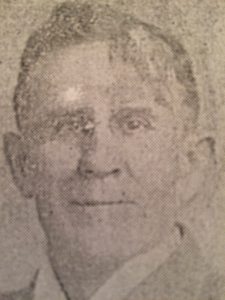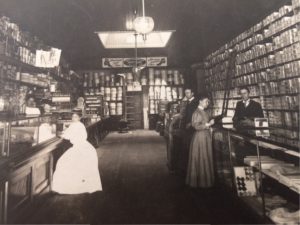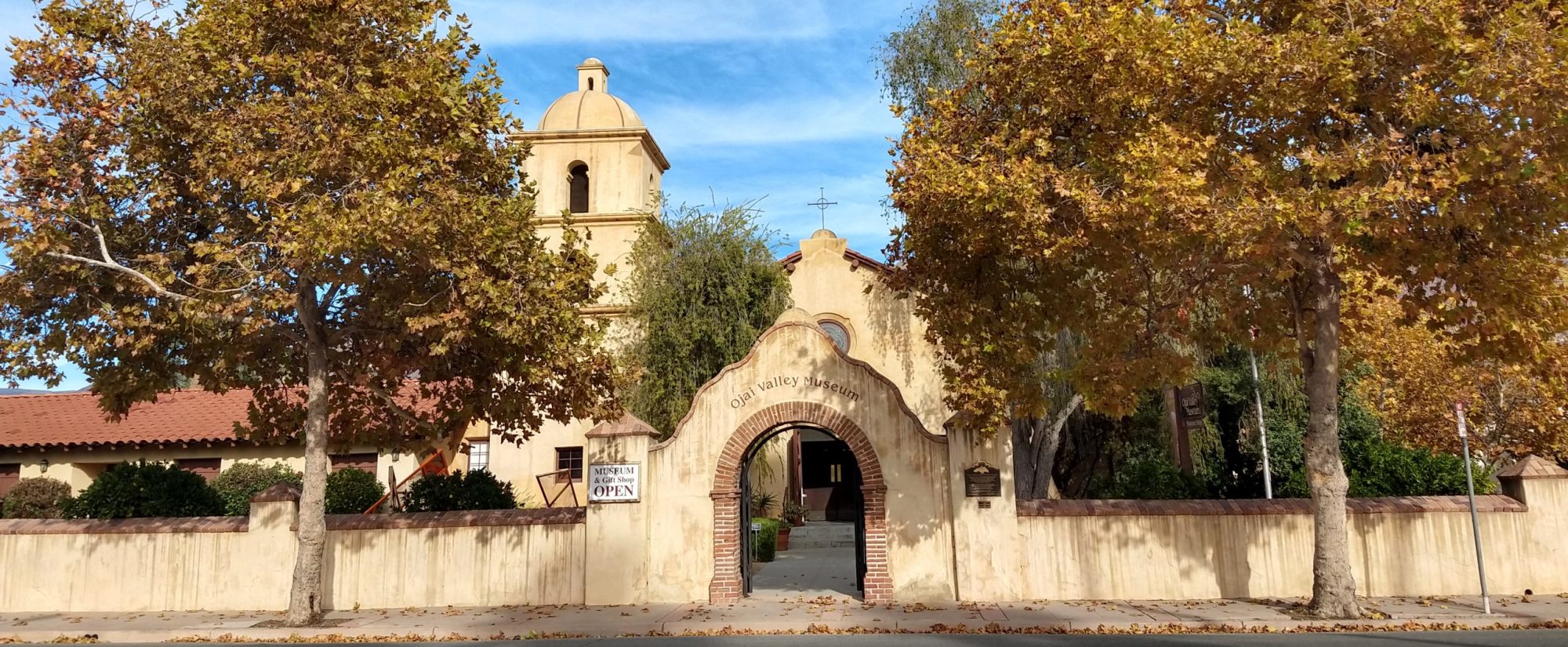The following article was run in the January 28, 1970 edition of the Ojai Valley News. It is reprinted here with their permission. Photo of George W. Mallory courtesy of the Ojai Valley News. Photo of Mallory – Dennison Store added by the Ojai Valley Museum.
Controversy in 1893 over postmaster
by
Ed Wenig
As a rule, local politics in a village the size of Ojai are of interest to its residents only. But the year of 1893 proved to be the exception to the rule. In that year an election was held in the Ojai Valley which received national attention.
It came as the result of the election of Grover Cleveland, Democrat, to replace President Benjamin Harrison, Republican, in the White House. According to time-honored custom, this signified a nation-wide shifting of all local postmasterships from the incumbent Republicans to “deserving Democrats.” In Nordhoff it meant that B. F. Spencer, Republican postmaster, would normally expect to relinquish his position to a Democrat nominated by the local Democratic Committee.
But the attitude toward the “Spoils System” was undergoing a change throughout the nation, and, in tune with the times, some citizens of Nordhoff, including several Democrats, decided that this procedure was not in the best interest of the Ojai Valley. They resolved to take positive action to remedy the situation. Accordingly, the Ojai Club, which was made up of prominent citizens of the valley and which was very influential in the affairs of the community, received the following petition:
“TO THE OJAI CLUB: We, the undersigned residents of the Ojai Valley, believing in and desiring to initiate the principle of election of postmasters by the people, request of the Ojai Club—a non-partisan association—to take the proper steps for the holding of a PUBLIC ELECTION IN NORDHOFF; the returns of which would indicate the choice of its people for postmaster…”
(Signed)
James Braken, Democrat
Joseph Hobart, Republican
H. J. Dennison, Populist
W. L. Hall, Republican
John Murray, Jr., Democrat
J. R. Bennett, Independent
K. P. Grant, Republican
After due consideration the Ojai Club complied with the request and arranged for two election boards. One was instructed to handle the ballots for all the men over 18 years of age who were served by the local postoffice. Another was instructed to tally the women’s vote — this in spite of the fact that woman suffrage had not yet been granted. There were no public nominations, each voter merely writing the name of his choice on the ballot. Thus many received only one vote. However, the men generally voted for the incumbent, B. G. Spencer, and the women split their vote between Spencer and G. W. Mallory, the choice of the Democratic Committee.

This novel election aroused widespread interest in the communities throughout the nation. The MORNING BULLETIN of Norwich, Connecticut gave a detailed account of the election in an article entitled, “A NORDHOFFIAN METHOD.” Its concluding sentence was, “It has not been announced yet whether Headman Maxwell, within whose jurisdiction the Nordhoff post office is, favored the people or the machine.”
In this case, the “machine” turned out to be the winner, and Mallory, the choice of the Democratic Committee, was duly appointed postmaster. After the election, but before Mallory’s appointment, the local editor commented, “The irregular election last Saturday to ascertain the choice of the people of Ojai for postmaster of Nordhoff was deemed a success by those most interested. It is not, and was not expected that the result of the election will have any immediate influence in Washington. It is designed as a reform measure, to secure a postmaster desired by the people who support the business, and should have a voice in the management of their own affairs. As G. W. Mallory is the choice of the Democratic Committee, he will probably receive the appointment, and he will be generally acceptable to the people.”
Mr. Mallory served as postmaster throughout the four years of the Cleveland administration, and in accordance with custom, was replaced by a Republican postmaster upon the election of the Republican William McKinley to the Presidency. Mallory regained his position in 1914 when the Democrats returned to power with the election of Woodrow Wilson. Thus he served the citizens of Nordhoff well as postmaster for a total of twelve years.
Mallory had come to the valley in 1886, establishing himself in a men’s furnishings store. He immediately began to devote much of his time and talent to the benefit of the community. During his 53 years in the valley he served the Presbyterian Church as elder and superintendent of the Sunday School; the Masonic Lodge as treasurer for nine years; the City Council, both as member and mayor; the Jack Boyd Club as director; and the elementary school district as clerk. His business activities included acting as director of the local bank and of the Ojai Power Company. After his retirement he became deputy assessor for Ventura County.

Mr. Mallory’s widow lives in Ojai, and his son, Bill Mallory, is a businessman in Ojai.
